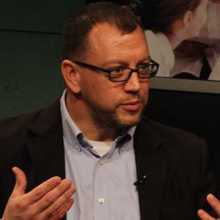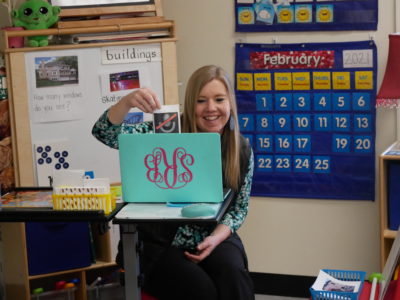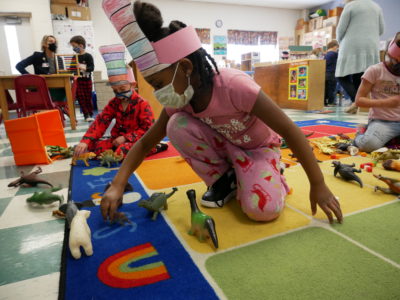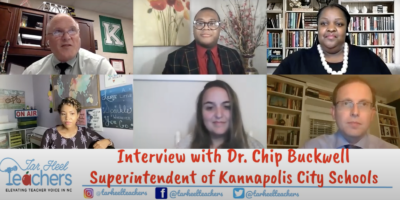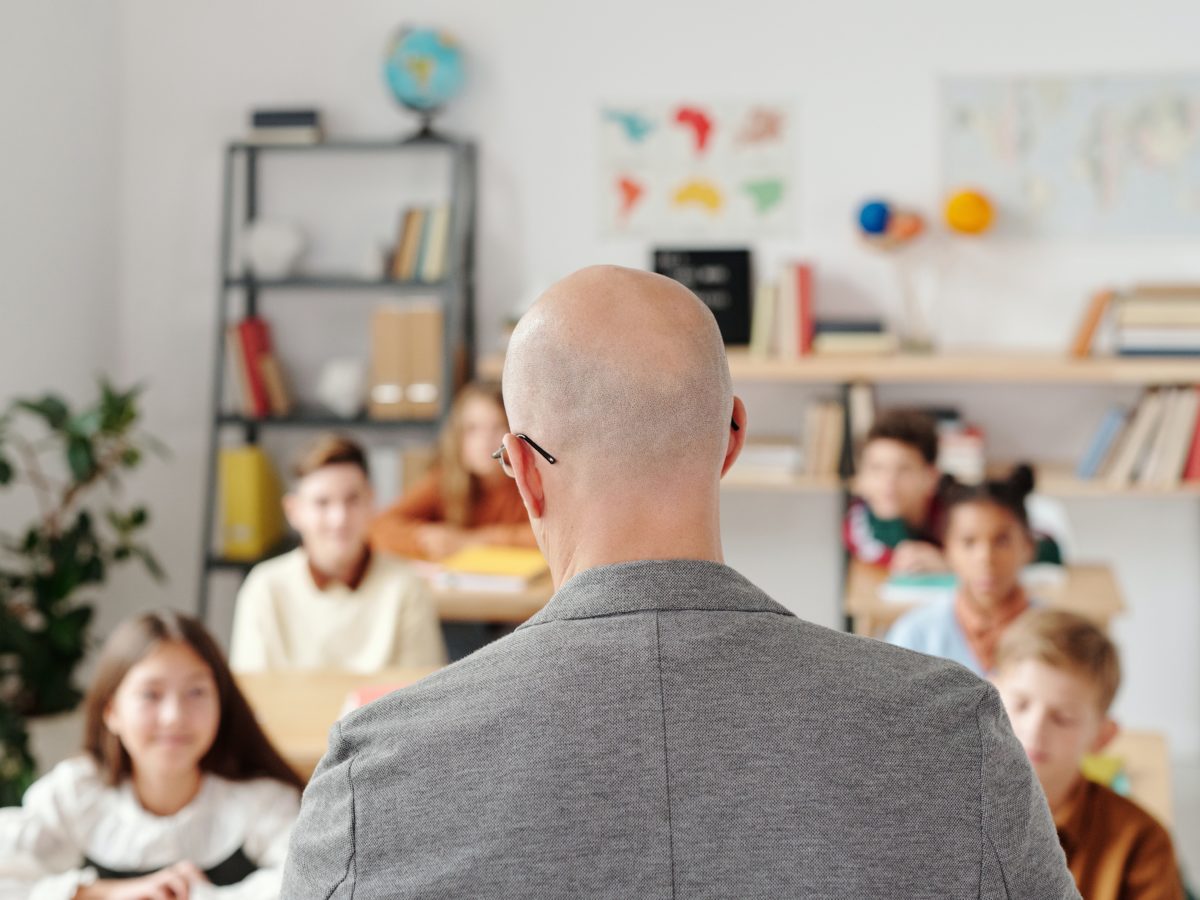

Scott Whitney is a teacher at Madison Early College High School in Marshall, and he just finished his third year of teaching and his first year teaching science — all during a pandemic. Whitney could be forgiven for being overwhelmed or scanning the exits, and he wouldn’t be the only one.
A National Education Association poll reported that 28% of teachers said they were more likely to retire early or leave the profession due to the pandemic. But Whitney chose to stay, and, not only that, he was recognized as his school’s Teacher of the Year. So, in addition to his can-do attitude, what (or who) keeps him coming back and doing great work?
Meet Julie Young. Young is part of a team of teacher-coaches in Madison County Schools who works closely with Whitney and other teachers. Whitney says, “The coaches have been more than willing to provide support, both technically and emotionally, through what has been an unprecedented educational experience. There were times … when Julie provided just the right nudge or encouragement to get me refocused and moving in a positive direction again. The coaches even sought out and welcomed help for their own struggles and allowed me to feel like I could contribute beyond my own sphere of influence.”
How do we retain teachers (even during a pandemic)? Coach them.
The turnover problem
The pandemic has amplified the challenge of retaining teachers, but it didn’t create it. In North Carolina in 2016-2017, the teacher turnover rate was 13.5% compared to a national average of 8%. Studies have also shown that teacher turnover disproportionately impacts high poverty schools and student achievement in math and science.
Financially, the estimated cost of replacing a teacher in an urban district is $20,000. This 2007 study looked at five districts across the country and used the following categories to calculate the cost of teacher turnover: recruitment, hiring, administrative processing, training for first-time teachers (induction), training for new hires (orientation), training for all teachers (professional development), learning curve, and transfer. The study found that, “In Granville County, North Carolina, the cost of each teacher who left the district was just under $10,000… In a very large district like Chicago, the average cost was $17,872 per leaver.”
In our work at Constructive Learning Design with teachers, coaches, principals, and other education leaders, we spend a lot of time trying to figure out the best questions to ask and the most important problems to address.
Which questions will guide us toward the biggest and best impacts on student learning? What problems should we solve first?
Teachers matter and so does experience
Not surprisingly, there is considerable evidence that when it comes to impact on student achievement, teachers matter greatly and so does experience. In addition to their direct impact on student learning, more-experienced teachers also contribute to school communities and teacher morale by acting as mentors, department heads, PLC leaders, coaches, and other official and unofficial roles.
Leslie Schoof, another teacher-coach at Madison High School, shares an example of how Hannah Worley and the rest of the Madison teacher-coaches support their peers: “Hannah’s strength lies in her ability to act as a liaison between our faculty and administrators. She does a great job of listening to teacher concerns and then communicating those to decision-makers… This helps our teachers feel heard, which in turn allows their own sense of efficacy to grow — increasing their enthusiasm for teaching and commitment to the practice. A big part of our work as coaches is to act as that bridge between administration and faculty; to help create a working environment that people feel comfortable in and want to remain in.”
Among the daily onslaught of questions that school and district leaders are trying to answer, we believe some of the most important and urgent are: What are the best ways to retain teachers? How do we create an environment to which they want to return?
Promising data on instructional coaching and teacher retention
There is growing evidence that instructional coaching can have a significant impact on teacher retention. Instructional coaching is an approach to teacher development where coaches provide ongoing, on-the-job learning that honors teachers as peers and professionals. Instructional coaches work with teachers one-on-one and in small groups to design lessons, co-teach, observe, and discuss the effectiveness of learning experiences. Teacher-coaches, like those in Madison County Schools, split their time between teaching students and coaching teachers.
Instructional coaching is relatively new, and there is limited research and evaluation focused on coaching, which is why Constructive Learning Design partnered with Gina Childers of Texas Tech University and the Career and Technical Education department of Charlotte-Mecklenburg Schools to study the impact of our 3-D model of instructional coaching on teacher retention. We looked at teacher retention data from 2013 to 2018 to try to answer the question: What is the trend of instructional coaching support and CTE lateral-entry teacher retention rates?
From the first year of data, when teachers received no training or coaching, to the last year, when teachers received four days of professional development and eight individual coaching visits, there was a 33% increase in teacher retention.
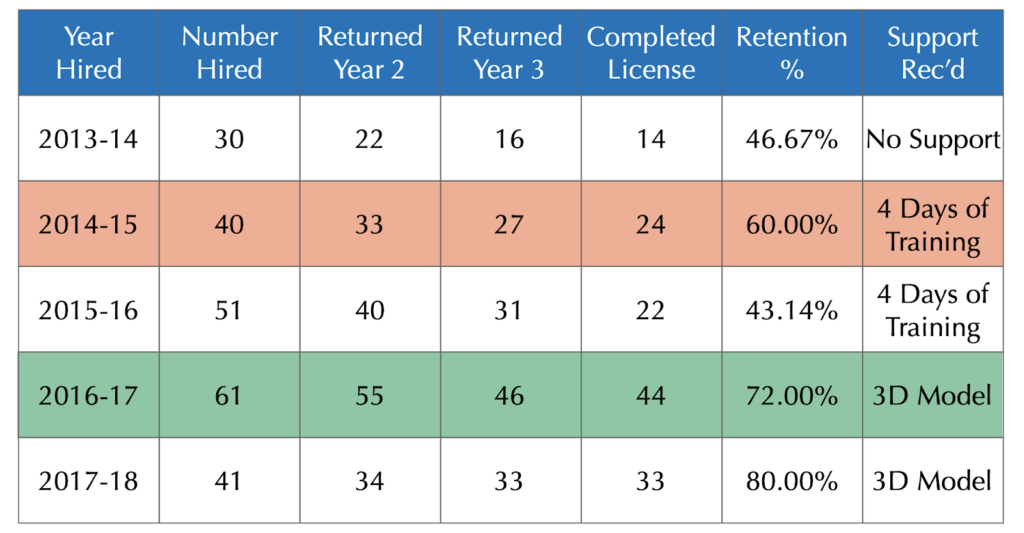

Susan Gann, Charlotte-Mecklenburg Schools’ director of career and technical education, says, “Supporting our new teachers with coaching not only helps them develop their teaching skills, but has led to higher teacher retention rates which is good for our students. We have tracked the data in our district and we know that coaching makes a difference. Coaching plays a big part in building their own self-efficacy and desire to stay the course as a teacher.”
Whitney adds this about the impact of Young and the other teacher-coaches: “The school culture didn’t go down the tubes as a result of the pandemic influences. I fear that without some of the positive vibes and supports provided by the coaches there could have been a significant downturn in staff outlook.”
What questions are guiding your work?
As we set our sights on supporting students, schools, and communities in the wake of the pandemic, we are proud to be part of a community of educators and researchers who are focused on finding the most effective and sustainable ways to improve student learning.
For more information on our coaching research, see our working paper with CollectivED from Leeds Beckett University’s Carnegie School of Education, and our research poster from Harvard Medical School’s Institute of Coaching conference. To learn more about how we worked with Madison County to build a team of teacher-coaches, click here.
How is your school or district working to retain teachers? What questions are guiding your work?
